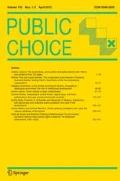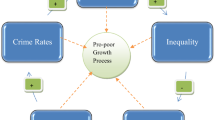Abstract
Due to strong evidence indicating that tax morale affects actual tax-paying behavior, finding the determinants of tax morale could help both to understand and to fight tax evasion. In this paper we analyze the effect of progressive taxation on individual tax morale using a cross-country approach—a research question that has not been investigated in the existing literature. Our theoretical analysis leads to two testable predictions. First, an individual’s tax morale is higher, the more progressive the tax schedule is. Second, the positive impact of tax progressivity on tax morale declines with income. In our empirical analysis we make use of a unique dataset of tax progressivity measures, namely the World Tax Indicators, and follow most of the tax morale literature by employing the World Values Survey to measure individual tax morale. Controlling for a wide range of potential confounders, we are able to confirm both hypotheses in our empirical analysis.
Similar content being viewed by others
References
Ackert, L. F., Martinez-Vazquez, J., & Rider, M. (2007). Social preferences and tax policy design: some experimental evidence. Economic Inquiry, 45(3), 487–501.
Ainsworth, M., & Filmer, D. (2002). Poverty, AIDS and children’s schooling: a targeting dilemma (Policy Research working paper No. 2885). The World Bank.
Alesina, A., Di Tella, R., & MacCulloch, R. (2004). Inequality and happiness: are Europeans and Americans different? Journal of Public Economics, 88(9–10), 2009–2042.
Alesina, A., & Giuliano, P. (2011). Preferences for redistribution. In J. Benhabib, A. Bisin, & M. O. Jackson (Eds.), Handbook of social economics (pp. 93–131). Amsterdam: North-Holland.
Allingham, M. G., & Sandmo, A. (1972). Income tax evasion: a theoretical analysis. Journal of Public Economics, 1(3–4), 323–338.
Alm, J., & Gomez, J. L. (2008). Social capital and tax morale in Spain. Advances in Economic Analysis & Policy, 38(1), 73–87.
Alm, J., & Torgler, B. (2006). Culture differences and tax morale in the United States and in Europe. Journal of Economic Psychology, 27(2), 224–246.
Alm, J., McClelland, G. H., & Schulze, W. D. (1992). Why do people pay taxes? Journal of Public Economics, 48(1), 21–38.
Alm, J., Martinez-Vazque, J., & Torgler, B. (2006). Russian attitudes toward paying taxes—before, during, and after the transition. International Journal of Social Economics, 33(12), 832–857.
Anderson, G. M., Martin, D. T., & Tollison, R. D. (1987). Do tax loopholes increase or decrease tax revenue? Journal of Public Finance and Public Choice, 5, 83–95.
Andreoni, J., Erard, B., & Feinstein, J. (1998). Tax compliance. Journal of Economic Literature, 36(2), 818–860.
Atkinson, A. B., & Brandolini, A. (2011). On the identification of the “middle class”. In J. C. Gornick & M. Jaentti (Eds.), Inequality and the status of the middle class. Stanford: Stanford University Press.
Becker, G. S. (1968). Crime and punishment: an economic approach. Journal of Political Economy, 76(2), 169–217.
Bellemare, C., Kroeger, S., & v. Soest, A. (2008). Measuring inequity aversion in a heterogeneous population using experimental decisions and subjective probabilities. Econometrica, 76(4), 815–839.
Corneo, G., & Gruener, H. P. (2002). Individual preferences for political redistribution. Journal of Public Economics, 83(1), 83–107.
Cummings, R. G., Martinez-Vazquez, J., McKee, M., & Torgler, B. (2009). Tax morale affects tax compliance: evidence from surveys and an artefactual field experiment. Journal of Economic Behavior & Organization, 70(3), 447–457.
Dell’Anno, R. (2009). Tax evasion, tax morale and policy maker’s effectiveness. The Journal of Socio-Economics, 38(6), 988–997.
Eckel, C., & Gintis, H. (2010). Blaming the messenger: notes on the current state of experimental economics. Journal of Economic Behavior & Organization, 73(1), 109–119.
Elffers, H., Weigel, R. H., & Hessing, D. J. (1987). The consequences of different strategies for measuring tax evasion behavior. Journal of Economic Psychology, 8(3), 311–337.
EVS/WVS (2006). European and World Values Surveys four-wave integrated data file, 1981–2004. Surveys designed and executed by the European Values Study Group and World Values Survey Association. Resource document. http://worldvaluessurvey.org/. Accessed June 2010.
Fehr, E., & Schmidt, K. M. (1999). A theory of fairness, competition, and cooperation. The Quarterly Journal of Economics, 114(3), 817–868.
Fehr, E., & Schmidt, K. M. (2006). The economics of fairness, reciprocity and altruism—experimental evidence and new theories. In S.-C. Kolm & J. M. Ythier (Eds.), Foundations, handbook on the economics of giving, altruism and reciprocity (Vol. 1, pp. 615–691). Amsterdam: Elsevier.
Feld, L. P., & Frey, B. S. (2007). Tax compliance as the result of a pychological tax contract: the role of incentives and responsive regulation. Law & Policy, 29(1), 102–120.
Fong, C. (2001). Social preferences, self-interest, and the demand for redistribution. Journal of Public Economics, 82(2), 225–246.
Frey, B. S., & Feld, L. P. (2002). Deterrence and morale in taxation (CESifo working paper No. 760).
Frey, B. S., & Torgler, B. (2007). Tax morale and conditional cooperation. Journal of Comparative Economics, 35(1), 136–159.
Gueth, W., Schmittberger, R., & Schwarze, B. (1982). An experimental analysis of ultimatum bargaining. Journal of Economic Behavior & Organization, 3(4), 367–388.
Halla, M. (2010). Tax morale and compliance behavior: first evidence on a causal link (Johannes Kepler University of Linz working paper No. 1066).
Heinemann, F. (2010). Economic crisis and morale. European Journal of Law and Economics, 1–15.
Heinemann, F., & Hennighausen, T. (2010). Don’t tax me? Determinants of individuals towards progressive taxation (ZEW discussion paper No. 10-017).
Heinemann, F., & Kocher, M. G. (2010). Tax compliance under tax regime changes (Munich discussion paper 2010-17).
Hull, B. B. (2000). Religion still matters. Journal of Economics, 26(2), 35–48.
Inglehart, R. (2000). Codebook for World values survey. Ann Arbor: Institute for Social Research.
Inglehart, R. (2010). Values change the world. Resource document. http://worldvaluessurvey.org/. Accessed April 2010.
Kahneman, D., Knetsch, J., & Thaler, R. H. (1986). Fairness as a constraint on profit seeking: entitlements in the market. American Economic Review, 76(4), 728–741.
Konow, J. (2003). Which is the fairest one of all? A positive analysis of justice theories. Journal of Economic Literature, 41(4), 1188–1239.
Konrad, K. A., & Qari, S. (2009). The last refuge of a scoundrel? Patriotism and tax compliance (IZA discussion paper series No. 4121).
Martinez-Vazquez, J., & Torgler, B. (2009). The evolution of tax morale in modern Spain. Journal of Economic Issues, 43(1), 1–28.
McKinnish, T. (2007). Welfare-induced migration at state borders: new evidence from micro-data. Journal of Public Economics, 91(3–4), 437–450.
Moulton, B. R. (1986). Random group effects and the precision of regression estimates. Journal of Econometrics, 32(3), 385–397.
OECD (2008). Growing unequal? Income distribution and poverty in OECD countries. Paris: Organisation for Economic Co-Operation and Development.
Peter, K. S., Buttrick, P., & Duncan, D. (2010). Global reform of personal income taxation, 1981–2005: evidence from 189 countries. National Tax Journal, 63(3), 447–478.
Pommerehne, W. W., & Weck-Hannemann, H. (1996). Tax rates, tax administration and income tax evasion in Switzerland. Public Choice, 88(1–2), 161–170.
Richardson, G. (2006). Determinants of tax evasion: a cross-country investigation. Journal of International Accounting, Auditing and Taxation, 15(2), 150–169.
Slemrod, J. (2003). Trust in public finance. In S. Cnossen & H.-W. Sinn (Eds.), Public finance and public policy in the new century (pp. 49–88). Cambridge: MIT Press.
Slemrod, J. (2007). Cheating ourselves: the economics of tax evasion. Journal of Economic Perspectives, 21(1), 25–48.
Slemrod, J., & Yitzhaki, S. (2002). Tax avoidance, evasion, and administration. In A. J. Auerbach, & M. Feldstein (Eds.), Handbook of public economics (Vol. 3, pp. 1423–1470). Amsterdam: Elsevier.
Tittle, C. (1980). Sanctions and social deviance: the question of deterrence. New York: Praeger.
Torgler, B. (2002). Speaking to theorists and searching for facts: tax morale and tax compliance in experiments. Journal of Economic Surveys, 16(5), 657–683.
Torgler, B. (2004). Tax morale in Asian countries. Journal of Asian Economics, 15(2), 237–266.
Torgler, B. (2005). Tax morale in Latin America. Public Choice, 122(1–2), 133–157.
Torgler, B. (2006). The importance of faith: tax morale and religiosity. Journal of Economic Behavior & Organization, 61(1), 81–109.
Torgler, B. (2007). Tax compliance and tax morale: a theoretical and empirical analysis. Cheltenham: Edward Elgar.
Torgler, B., & Schneider, F. (2009). The impact of tax morale and institutional quality on the shadow economy. Journal of Economic Psychology, 30(2), 228–245.
Torgler, B., Demir, I. C., Macintyre, A., & Schaffner, M. (2008). Causes and consequences of tax morale: an empirical investigation. Economic Analysis and Policy (EAP), 38(2), 313–339.
World Bank (2010). The Word Development Indicators. Resource document. http://databank.worldbank.org/. Accessed June 2010.
Wu, S.-Y., & Teng, M.-J. (2005). Determinants of tax compliance. A cross-country analysis. Finanzarchiv, 61(3), 393–417.
Yitzhaki, S. (1974). A note on income tax evasion: a theoretical analysis. Journal of Public Economics, 3(2), 201–202.
Young, M., Reksulak, M., & Shughart II, W. F. (2001). The political economy of the IRS. Economics and Politics, 13(2), 201–220.
Author information
Authors and Affiliations
Corresponding author
Rights and permissions
About this article
Cite this article
Doerrenberg, P., Peichl, A. Progressive taxation and tax morale. Public Choice 155, 293–316 (2013). https://doi.org/10.1007/s11127-011-9848-1
Received:
Accepted:
Published:
Issue Date:
DOI: https://doi.org/10.1007/s11127-011-9848-1



